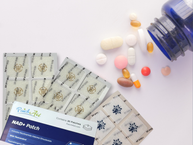Do you ever notice that your mood is a little bit off? It may be in the form of feeling sad for no real reason, or you might feel overly tired during the day. Or, anxiety could make it difficult to concentrate or sleep. These are just a few examples of ways that mood can be altered if something’s not quite right in your body.
It’s possible that the signs you are noticing are related to a vitamin deficiency. Vitamins are needed for every process in your body. A deficiency in one or more essential vitamins or other nutrients can affect the way your brain functions. They can cause changes in energy levels, mood, or anxiety.
Here are some vitamins and other nutrients that can affect mood if you’re deficient in them. There are PatchAid Patches that contain each of these nutritional compounds, and they’re super easy to use. Ask your doctor if they may be right for you if a nutritional inadequacy may be affecting your mood.*
B Vitamins
There are a lot of B vitamins, and they’re all possibly implicated in mood disorders if they’re deficient! Let’s start with the last one: vitamin B12. It’s important in the formation of healthy red blood cells, which allow the cells of your body to get enough oxygen for normal energy production. And, it has roles in regulating brain chemicals, such as serotonin and dopamine, which are needed for normal mood. Plus, vitamin B12 is needed for nerve function and regulation of stress hormones.
Vitamin B12 deficiency has been linked to an increased risk for depression. Other symptoms can include mood swings, confusion, dementia, and paranoia. You can feel numbness or tingling in the hands or feet if vitamin B12 deficiency gets severe.
There are many other B vitamins. Some, like vitamin B6 and folic acid, are also need for healthy red blood cells. Vitamins B1, B2, B3, B5, and B6 are also needed for proper metabolism of protein, fat, and carbohydrates. Without them, you’re likely to feel tired and have trouble concentrating.
B vitamins are in all kinds of foods, as you might imagine given the great number of them. Fortified grains, including bread and breakfast cereal, meat and poultry, fish, nuts, beans, and vegetables are some examples of wholesome sources of B vitamins.
But some people are at risk for deficiencies of some B vitamins, and some people happen to need higher amounts of one or more B vitamins. People who have had weight loss surgery, people who are on a restricted diet, people who eat only plant-based foods, or a vegan diet, and older adults are examples of specific groups that may be at higher risk for deficiencies of one or more B vitamins.
The Vitamin B12 Energy Plus Patch by PatchAid* has vitamin B12 and all of the other B vitamins, including biotin. It has a high dose of vitamin B12 and doesn’t require an injection like some B12 supplements. Plus, there’s no sugar or caffeine, so no risk of an energy crash.
Vitamin D
Vitamin D is needed for strong bones, since it helps your body absorb and use calcium. It also helps your body maintain a normal immune system and healthy heart. More related to mood, vitamin D is also part of hormonal production as well as the activity of neurons and related factors. A deficiency can lead to fatigue, anxiety, and depression.
Vitamin D is also known as the sunshine vitamin. The reason is that your skin is stimulated to start the process of activating vitamin D when you get exposure to UV radiation from the sun. There are some other things to think about, though. First, going outside regularly in the sunshine, especially if you have the chance to be active, can lower the risk for depression and anxiety. Even if you’re not doing it just for vitamin D, it’s good to be outside as long as you’re properly protected from the sun.
The other thing to consider is that not everything gets enough sun exposure to make enough vitamin D. And, vitamin D isn’t in many foods. Fatty fish and egg yolks are examples of natural sources. It’s also in vitamin D-fortified milk.
These people are at risk for low levels of vitamin D.
- Older adults
- People with darker skin
- People who use sunscreen or cover themselves while in the sun
- People who live in northern climates
As you can see, it’s a large group! Not surprisingly, a lot of people are deficient.
The Vitamin D3/Calcium Patch by PatchAid* has vitamin D, as well as calcium and magnesium. It’s an easy way to get more vitamin D without taking a pill or exposing yourself to harmful radiation from the sun without protection.
Magnesium
Magnesium is an essential mineral for strong bones, since it’s a major part of your bone mineral. But it’s also necessary for energy-producing reactions in your body and for proper nerve and muscle function. Deficiency could lead to personality changes as well as sodium retention, muscle spasms, and loss of appetite. That’s not great for mood!
Examples of food sources of magnesium are cashews, brown rice, oat bran, fish, and spinach. The average American adult could do with a bit more magnesium. The Vitamin D3/Calcium Patch by PatchAid contains magnesium.
Iron
Iron is a mineral that’s part of healthy red blood cells. You need it for a strong immune system. And it plays a role in energy metabolism. What does iron have to do with mood? It turns out that iron is very important in mood regulation! It’s easy to get your iron levels checked with some blood tests.
Iron deficiency can make you feel weak and exhausted. That’s because your red blood cells can’t deliver enough oxygen to the cells in your body, so it’s hard to get the energy you need. At the same time, you might have trouble sleeping. It’s no wonder you might feel anxious, depressed, irritable, and unable to concentrate if you’re deficient in iron!
Iron is in foods such as meat, seafood, beans, leafy green vegetables, and fortified cereals, but it’s still a commonly deficient mineral. People who don’t eat meat or poultry, women, growing children, and people with malabsorptive disorders or weight loss surgery are at especially high risk for iron deficiency.
When you have a deficiency, it’s hard to eliminate it with food alone. Instead, a supplement is usually needed. The Iron Plus Vitamin Patch has vitamins A and C, vitamin B9, astaxanthin, and iron. The Simply Iron Patch by PatchAid has just iron. Ask your doctor which may be right for you! A patch avoids the problems of constipation and diarrhea, which are notorious among people who take oral iron supplements.
Omega-3 Fatty Acids
Omega-3 fatty acids are known for their heart-healthy benefits, as well as for their likely benefits in blood sugar control and brain health. It’s no surprise, then, that omega-3 fatty acids can affect mood as well. A deficiency can lead to changes in the brain and body, such as increased inflammation.
You can get long-chain omega-3 fatty acids from seafood, especially fatty fish. Salmon, trout, tuna, and sardines are examples of great sources of EPA and DHA. Flaxseed, walnuts, and canola oil have short-chain omega-3 fats called ALA. Most people don’t get enough. The Omega-3 Vitamin Plus Patch from PatchAid has all of these fatty acids, along with antioxidants such as coenzyme Q10 and astaxanthin.
Mood and Sleep
Adequate sleep is necessary for normal mood regulation. Without enough sleep, you’re likely to feel tired during the day. You might feel irritable, have trouble concentrating, or be less able to enjoy things that you know you should.
If you’re finding yourself short on sleep, it can help to take stock of your sleep hygiene and work on changing any bad habits. These are some tips for better sleep.
- Avoiding caffeine or alcohol before bed.
- Sleeping in a cool, dark, quiet room.
- Having a relaxing bedtime routine.
- Avoiding electronics before bedtime.
The Sleep Aid Patch by PatchAid contains melatonin, which is a hormone that your body produces naturally when it’s time to sleep. It also has L-tryptophan and 5-HTP, which are needed for your body to produce certain neurotransmitters linked to healthy sleep. The patch contains valerian root and hops flower as well.
More Nutritional Support for Mood Regulation
While outright nutrient deficiencies can affect or even impair mood, there are other compounds that can affect mood, too. Many PatchAid Vitamin Patches include components that aren’t essential vitamins or minerals, but that have been used for years for specific reasons. Herbal supplements are natural ingredients.
The Relax and Unwind Vitamin Patch* is one example of a PatchAid patch with essential vitamins and minerals as well as herbal ingredients. It has vitamins B1, B2, B3, B5, and B6, biotin, and zinc. It also has ashwagandha root powder, rhodiola rosea extract, ginger root extract, and passion flower powder. These have been used to reduce harm from an overactive sympathetic nervous system response and to allow relaxation and normalization of mood.* The patch also has GABA, which is needed for health mood regulation.
Which Vitamin Patch Is Best for Mood?
There are many different answers to this question. If you have a deficiency of just one vitamin or a few related vitamins, the vitamin patch that’s best for mood is the one that has the nutrient or nutrients that you’re deficient in.
But what if you’re not sure which single nutrient or group of nutrients you need? Or what if you have additional nutrient deficiencies? Or what if you’re already using a vitamin patch for a different purpose, such as Weight Loss or Heart Health or Joint Support?
Don’t worry! You don’t just have to choose one vitamin patch. PatchAid Vitamin Patches are designed for people to use up to eight patches at once. That means you can address your various needs without having to prioritize certain ones over others.
Lots of people use the Multivitamin Plus Patch by PatchAid for overall nutritional support, since it has all of the vitamins and more than 10 essential minerals. They include zinc, which is another mineral that’s been linked to being required for normal mood regulation in the body.
In addition, you can use a patch that addresses a specific vitamin deficiency for mood support, along with any other patches you might be using.
The Mood Stabilizer Patch Pack is designed for people who are looking for overall mood support. It has these patches.
The vitamin patch that’s best for mood is the one that you need, and it may be more than one patch. Ask your healthcare provider which may be best for you.
Keep in mind that a mood-boosting vitamin supplement shouldn’t stress you out. That’s a nice benefit of using vitamin patches. They’re easy to use, and you don’t have to swallow a large pill or something that doesn’t taste good. Just peel off the adhesive backing and stick the patch onto a clean, dry area of skin. Then take it off 8 hours later.
Vitamin deficiencies can affect every aspect of well-being, and that includes mood. If you suspect you have a vitamin deficiency or you are noticing signs such as feeling down or having trouble relaxing for no apparent reason, it’s best to ask your healthcare provider. A Vitamin Patch may contain nutrients that you need to normalize brain and body, and to support normal moods.*
*The Food and Drug Administration has not evaluated these statements. PatchAid patches are not intended to diagnose, treat, cure or prevent any disease. Anyone with a medical condition should seek the advice of a licensed medical practitioner. Individual results may vary.







